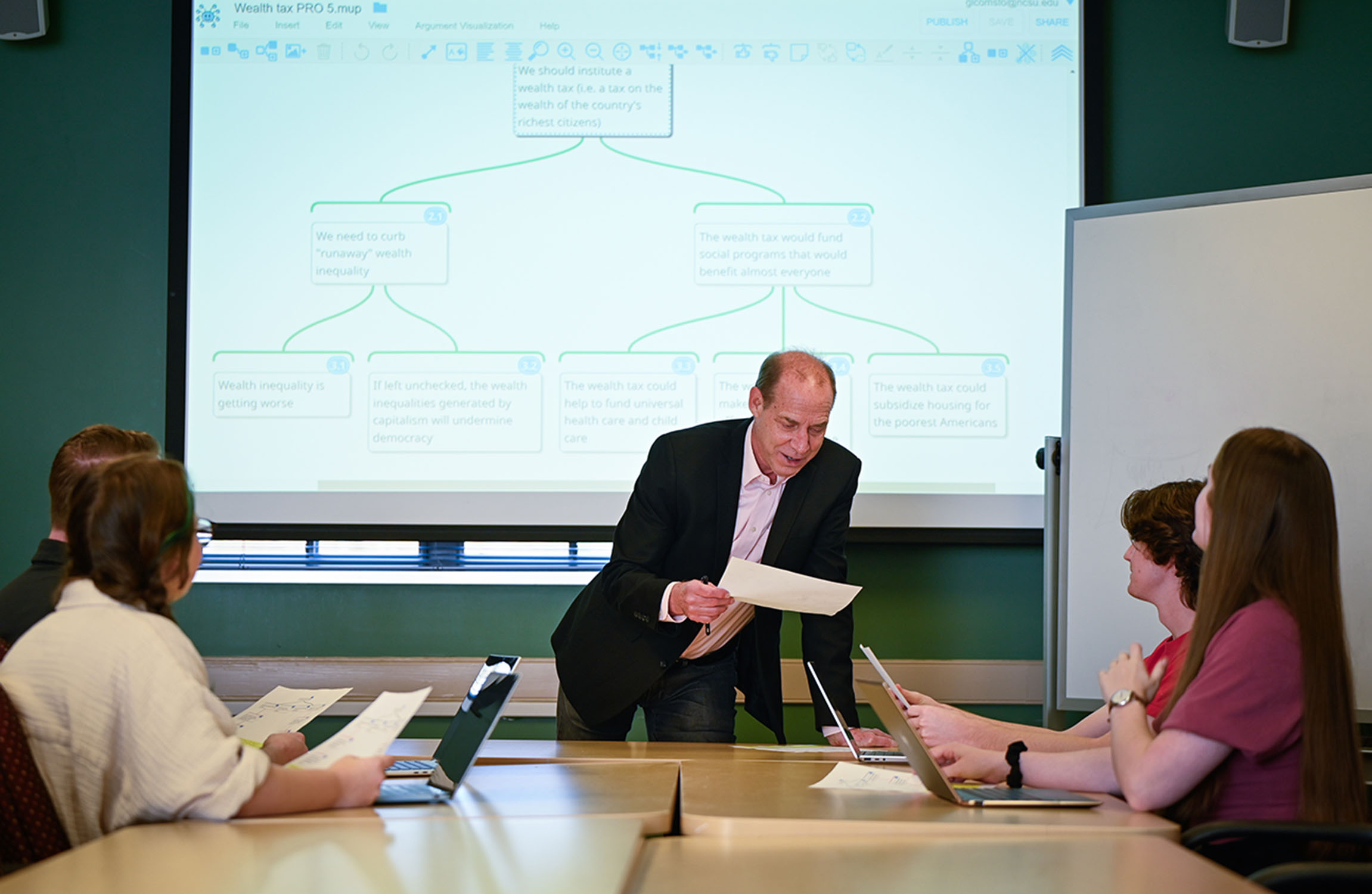How Can We Handle Stress and Stay Positive During a Pandemic?

A lot of people are experiencing more stress than usual. People have concerns not only about COVID-19, but about related financial challenges, changes in routine, and spending too much time (or not enough) with friends and loved ones. What can we do to manage this stress and maintain a positive attitude?
To find out, we talked with Shevaun Neupert, a professor of psychology at NC State who studies the ways that people cope with stress – and what makes some coping strategies more effective than others.
The Abstract: Is coping with stress something that we can be proactive about? Or is coping with stress really about how we respond to stressful events?
Shevaun Neupert: It is definitely possible to cope before, during and after stressful events. Most of the research on stress has focused on how we respond after an event has occurred. But we know there are characteristics some people have that might make them respond more negatively or more resiliently to stress. For example, people who are neurotic, which is a personality trait characterized by constant elevated levels of negative mood, tend to respond more negatively to stress.
But in addition to personality characteristics – which are relatively stable – there is also a dynamic component to coping with stress. Specifically, the way that we appraise, or think about, something stressful depends on the type and severity of the stress. Coping works best when our efforts to deal with the stressor match the demands of the situation and the resources we have available to tackle them.
Some of the recent work in my lab has focused on the idea of coping before something stressful happens. This sort of proactive coping is future-oriented and typically involves goal setting, as well as planning for adverse events and expending resources to prevent them or to reduce their impact.
Proactive coping reduces the likelihood of experiencing future stressors. That means people who do more proactive coping tend to encounter fewer stressful experiences, because their coping efforts help them avoid stressors. There are both cognitive components (e.g., thinking about plans) as well as behavioral components (e.g., allocating resources). People who engage in proactive coping are likely to agree with statements such as: “I try to take care of little problems before they become big problems”; “I prepare for adverse events”; “Rather than spending every cent I make, I like to save for a rainy day”; “I like to plan ahead”; and “I’m willing to spend time, energy or money now to save a greater amount of time, energy, or money later.”
Overall, proactive coping is associated with many positive outcomes, such as higher levels of quality of life, fewer symptoms of PTSD, lower levels of stress and lower levels of depression.
And we all know that some stress can last for a long time, so it is important to think about ways to cope and boost resilience during stress.
TA: What are some things that people can do to make themselves more resilient when stressful things happen?
Neupert: One promising path to boosting resilience could be mindfulness. Mindfulness brings non-judgmental awareness to the present. That means an awareness of what is happening or being felt right now without attempting to change it. It is accepting the here and now. Because of this acceptance and non-judgmental awareness, mindfulness is typically associated with reduced stress and anxiety. In a recent study, we looked at the combination of proactive coping (planning ahead) and mindfulness (staying present in the moment). It is overly simplistic to say that people should spend all of their time and energy planning ahead while ignoring the present, and we certainly know that neglecting the future at the expense of the present is a bad idea as well. Our results highlight the real tension that humans experience in balancing plans for the future with living in the moment.
We found in our study that the people who had the best response to daily stressors (e.g., arguments, work-related stressors, stressors at home) were those who engaged in proactive coping as a general outlook and were also able to stay mindful on a day-to-day basis. This is admittedly a challenging balance.
TA: Are there things we can do after a stressful event to minimize the effect that it has on us?
Neupert: People can attempt to balance future-oriented and present-oriented thinking by doing their best to proactively cope and avoid future stressors, but when daily stressors do crop up, being able to mindfully attend to the present is the best scenario.
TA: What do we do when our tried-and-true techniques for managing stress just aren’t working?
Neupert: Coping strategies that people may have used in the past to successfully navigate stressful experiences may not work the same way now. Usually, we find a few coping strategies that work for us, and we stick with them. However, people should not expect that what has worked for them in the past will work right now. My work highlights the idea that people need to match their coping strategy with the demands of the situation. And because we are all living in new situations that are unique to us and different from what other people may be experiencing, there should not be a “one size fits all” coping solution. Everyone should be encouraged to try various coping techniques.
TA: Are there things we can or should be aware of when there is a chronic source of stress, such as the COVID-19 pandemic?
Neupert: Chronic stress, especially when its duration is unpredictable, can permeate how we cope with day-to-day stress like arguments or work-related stressors. A previous study from my lab assessed participants’ chronic stress in terms of the amount of overload they felt. An example would be “How much have you felt swamped by your responsibilities?” Then we tracked their day-to-day stress, mood and tiredness for eight consecutive days.
People who reported the most chronic stress and experienced day-to-day increases in negative mood were the most vulnerable to the day-to-day stressors. In this case, they reported being the most tired. So for anyone who is feeling really tired during this COVID-19 pandemic, you are not alone. Our work suggests that if you can find ways to try to maintain a positive mood in the face of day-to-day stressors, that could prevent some of the feelings of tiredness.
These are highly unusual times. Our daily routines are disrupted. The future may seem more ambiguous or unpredictable than before. But there are things that people should be encouraged to look forward to, such as novel opportunities within their own day-to-day lives. We are encouraged (and many are mandated) to stay home. So what can you look forward to in your specific home environment? My own personal optimistic nature is to try to look forward to positive opportunities, but my work shows that it is also really important to look forward to possible stressful events. What are the implications of these changes in your daily routine? For many, this may mean job loss. For others, working from home. And nuclear families are navigating more time together while also being separated from extended family. Even within these scenarios, there are coping strategies that people may find useful to reduce their negative impact – so try out several! Try to make a plan that can help you cope with your own unique situation, and remember to live in the moment when those stressful events arise.
This post was originally published in NC State News.
- Categories:


